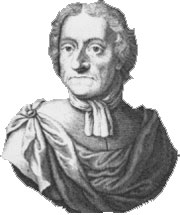| Profile | Major Works | Resources |
Veit Ludwig von Seckendorff, 1626-1692.

Born into a Protestant Franconian noble family at the height of the Thirty Years' War, Veit Ludwig von Seckendorff was initially raised in Coburg and Erfurt. He became a protege of the Duke Ernest of Saxe-Gotha in his early teens, and attended the gymnasium at Gotha, before proceeding to study law at Strasbourg in 1642. His father, then fighting for the Protestant camp, was captured and executed that same year. Around 1645, Duke Ernest appointed Seckendorff as valet of his library, assigning him the task of summarizing the books for him. Much of Seckendorff's vast learning was acquired in the course of this task.
In 1652, Seckendorff was appointed as a high judicial councillor at the relatively young age of 27. In 1655, he composed his principal work Teutsche Fürsten Staaten ("German Princely State"), a handbook of civil law and administration, often regarded as the founding treatise of German Cameralism. Seckendorff organizes his book in three parts, firstly, a detailed description of the country, its resources and its population, next a survey of government institutions, and finally, a discussion on the the best way to administer state property (i.e. the prince's demesne and monopolies) to secure the revenues for the prince. Seckendorff identified the chief virtues of the prince as caring for the welfare of his subjects and the advice of his officials. Seckendorff stretched that paternalistic role to the wider economy, assigning the State responsibility for increasing population, education, control of usury, regulation of trade, upholding contract law and encouraging the right resource allocation. In this manner, Seckendorff's handbook was the watershed between the old, narrow principles of royal household management and the newer, more expansive concerns of economic policy that would be taken up by later Cameralists.
Seckendorff eventually ascended to the high office of chancellor of Saxe-Gotha in 1664, although he soon resigned that for the lighter duties in the government of Saxe-Altenburg. His retirement after 1681 was spent exploring Christian pietism.
In 1692, Seckendorff was appointed the first rector of the newly-founded University of Halle, but did not live to see it take root. But three decades later, Seckendorff's treatise was the textbook assigned in the first classes of economics by Simon Peter Gasser at Halle in 1727.
|
Major Works of Veit Ludwig von Seckendorff
|
|
HET
|
|
Resources on Ludwig von Seckendorff
|
All rights reserved, Gonçalo L. Fonseca
